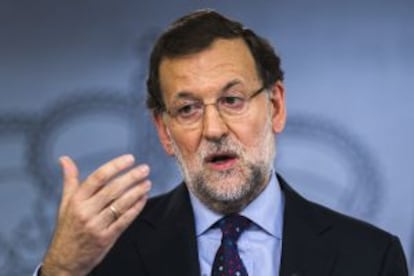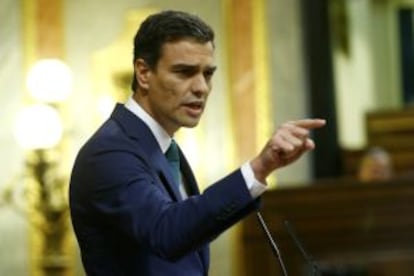Leading parties blame meteoric rise of Podemos on corruption
Latest voter intention poll shows newcomer would beat both PP and PSOE at elections

The unstoppable rise of Podemos, Spain’s newest party, has sent the country’s main political forces into damage-control mode — not to mention into shock.
One day after a Metroscopia poll for EL PAÍS revealed that the small, upstart party currently tops voter intention, ahead of the Socialists (PSOE) and the Popular Party (PP), both major groups have come to two main conclusions.
The first is that Podemos’s unprecedented success is due to the repercussion of a seemingly never-ending series of corruption cases affecting the mainstream parties. The poll was conducted last week, in the midst of the Púnica bid-rigging scandal, which is mostly affecting the PP and to a lesser degree the PSOE.
The second conclusion that Spain’s major parties have come to is that they are still in time to win back popular support if they scale up their initiatives against political corruption.
With municipal and regional polls coming up in seven months, and a general election a year from now, the race is on to show voters that they can still trust the same parties that have taken turns holding power in Spain since 1982.

But Podemos leader Pablo Iglesias, who has promised to sweep the country’s political “caste” off the map and give Spanish politics a fresh start, seems to have connected with voters like nobody before him ever had.
According to the Metroscopia survey, whose results must be confirmed by an official study by the Center for Sociology Studies (CIS) next week, Podemos would secure 27 percent of votes, 1.5 percentage points higher than the Socialists and seven points more than the ruling PP, which would get no more than 20.7 percent.
In a television interview on Telecinco, Socialist Secretary General Pedro Sánchez sought to play down the significance of the Metroscopia survey by noting that, in contrast with past polls showing increasingly low voter intention, “the PSOE has slowed down its deteriorating results and is beginning to gain votes.”
The race is on to show voters that they can still trust the same parties that have taken turns holding power in Spain since 1982
Then, acknowledging Podemos’ results, he added: “I consider myself a left-wing guy. Nobody can beat me when it comes to wanting to change politics, least of all Podemos.”
Sánchez himself has been secretary general of the PSOE only since late July, and was an unknown figure to Spaniards until then. He was elected in party primaries where members were allowed to cast direct votes for the first time, in an early attempt to introduce more democratic practices into Spanish party politics.
Meanwhile, Joaquín Almunia, a senior Socialist figure and EU official, says about Podemos that “we have to move on from listening to the music to reading the lyrics [...]. This is not an exclusive problem to Spain: antipolitics and populism are a presence in many countries.”
The PP is blaming the bad survey results on the effects of abstention, but it has also scrambled to kick out all party members involved in corruption investigations.
Podemos is taking the results “with prudence,” but underscoring what they see as a clear trend in Spain since the European elections.
“Spain is in a clear political era of decomposition,” said Iñigo Errejón, one of the party founders. “There is a feeling of change in the air and old [structures] will no longer be able to keep up.”

Never had a party progressed so quickly in just eight months, which is how long Podemos has been around. Created to run in the European elections of May 25, Iglesias’ team made headlines by obtaining five seats in the EU Parliament.
While the mainstream parties have portrayed Iglesias as a populist leader with suspect sympathies for Bolivarian regimes in Latin America (several party leaders sat on the board of a foundation that worked for the Venezuelan government under Hugo Chávez, and they have expressed admiration for some of his policies), Spaniards are mostly listening to the part about kicking out their corrupt, self-serving officials and letting fresh blood take over.
And so Mariano Rajoy of the PP and Pedro Sánchez of the PSOE say that their top priority is fighting improper conduct among their people. This month, Congress is due to debate a bill aimed at greater control over parties’ financial and economic activities, and at monitoring the activities of high-ranking officials.
Yet Sánchez is still refusing to sign a cross-party anti-corruption agreement with the PP, on the basis that the PP is “the party of corruption.” Besides Púnica, the center-right party is engulfed in the Caja Madrid opaque credit card scandal (which has also affected some Socialists and United Left politicians) and in the Gürtel bribes-for-contracts case, whose investigation also yielded what appear to be parallel party accounts that were allegedly used for illegal donations and shady cash payments.
The PSOE, for its part, is entangled in a public subsidy fraud scandal in Andalusia (known as the ERE case), and one of its mayors was arrested in the recent Púnica raid.
Tu suscripción se está usando en otro dispositivo
¿Quieres añadir otro usuario a tu suscripción?
Si continúas leyendo en este dispositivo, no se podrá leer en el otro.
FlechaTu suscripción se está usando en otro dispositivo y solo puedes acceder a EL PAÍS desde un dispositivo a la vez.
Si quieres compartir tu cuenta, cambia tu suscripción a la modalidad Premium, así podrás añadir otro usuario. Cada uno accederá con su propia cuenta de email, lo que os permitirá personalizar vuestra experiencia en EL PAÍS.
En el caso de no saber quién está usando tu cuenta, te recomendamos cambiar tu contraseña aquí.
Si decides continuar compartiendo tu cuenta, este mensaje se mostrará en tu dispositivo y en el de la otra persona que está usando tu cuenta de forma indefinida, afectando a tu experiencia de lectura. Puedes consultar aquí los términos y condiciones de la suscripción digital.








































